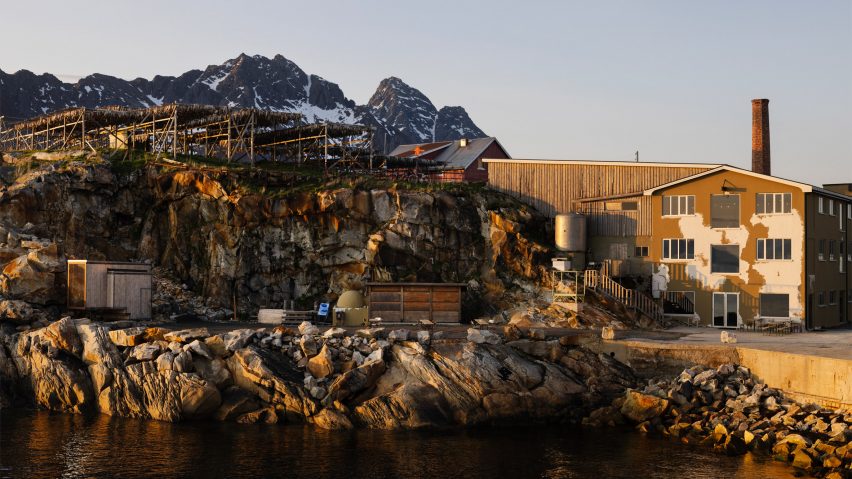London architecture studio Jonathan Tuckey Design has converted a former factory in Norway into a hotel and wellness centre, celebrating the traces of its previous uses.
Named Trevarefabrikken, the concrete-framed building in Henningsvaer in the Lofoten archipelago originally opened in the 1940s as a cod liver oil factory and carpentry workshop, before being abandoned.
In 2014, four friends purchased the dilapidated space with a view to refurbishing it with the help of the local community. Jonathan Tuckey Design was tasked with reworking its open-plan interior into a series of guest rooms and a restaurant.
Despite this radical change in use, Jonathan Tuckey Design looked to minimise alterations and retain as much of the "historical memory" of the factory as possible, including its board-marked concrete structure, rough rendered walls and even rusting machinery.
"The structural bones themselves were key to defining the layout of the space," explained project architect Dan Stilwell. "Unexpectedly deep concrete ribs ran throughout the interior, supported on equally unapologetically chunky columns," he continued.
"Rather than removing or adding to this structure, we looked at how to keep what was initially designed as a single warehouse space and divide it into intimate rooms that feel very separate and private," Stilwell added.
On Trevarefabrikken's ground floor, visitors enter into a large cafe and bar framed by concrete columns, with a small reception area and staircase leading up into the guest areas.
Above, a series of bedrooms flank a dark hallway ending at an industrial door. This leads to the light-filled Trandamperiet restaurant, which overlooks the Vestfjorden sea through large windows.
Formerly the cod liver oil production area, the first floor is punctuated by retained timber funnels and original machinery. Exposed concrete walls and ceilings in the bedrooms are softened by bespoke wooden fittings painted pale green.
"We were fascinated with the board-formed concrete surface, where the grain of long-past timber was imprinted in the surface for eternity before the board itself decayed," explained Stilwell.
"The machines themselves were kept not only a remnant of the past but also slightly mysterious sea-monster-like creatures greeting guests on the path to their rooms," he added.
Throughout, fittings and details have been created using both new and reused materials, including restored white tilework and steps up into the bedrooms that are formed from reclaimed bricks.
Trevarefabrikken's existing window openings were retained, with an additional layer of insulation and wooden shutters deepening the openings.
"We highlighted the feeling of hunkering down in a harsh landscape to seek refuge from the crashing waves," says Stilwell.
"This will be left to age naturally as before, settling into the island landscape the same way the building is settling into its newfound guise," he added.
Currently, the second floor remains a "work in progress", with the potential to provide further flexible accommodation, an events space or a bar in future stages of the project.
Reimagining existing buildings is a key focus of the work of Jonathan Tuckey Design. The studio's previous projects include the restoration and extension of a traditional farmstead in northern Italy and the reworking of a historic home in Cornwall with a stone-clad extension.
The photography is by Andrea Gjestvang.

